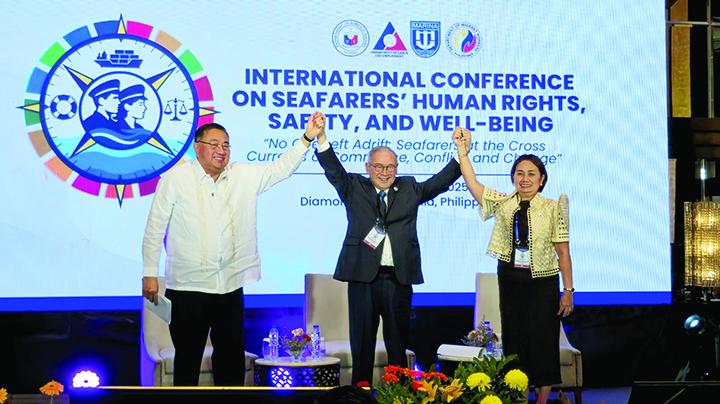You are here
Manila Declaration a blow for seafarers
Manila Declaration a blow for seafarers
Malou Talosig-Bartolome September 3, 2025 https://businessmirror.com.ph/2025/09/03/manila-declaration-a-blow-for-s...
Philippine Ambassador to London and IMO Permanent Representative Teodoro L. Locsin Jr. (center) raises the hands of Philippine Permanent Representative to the United Nations in Geneva Carlos D. Soretta (left) and MARINA Administrator Sonia Malaluan (right) at the close of the International Conference on Seafarers’ Human Rights, Safety and Well-Being in Manila.
THE Philippines on Tuesday unveiled the Manila Declaration on Seafarers’ Human Rights, Safety and Well-Being, a landmark non-binding framework that seeks to elevate global protections for maritime workers amid rising geopolitical, environmental, and industry risks.
The Declaration, launched at the close of a two-day international conference in Manila, outlines a rights-based agenda for seafarers—recognizing them as “key workers” in global supply chains and calling for urgent reforms across crisis response, gender equity, labor conditions, and industry transition.
Ambassador Carlos D. Soretta, the Philippines’ Permanent Representative to the United Nations in Geneva, said the initiative responds to the “sad state” of seafarers caught in conflict zones or abandoned during emergencies.
“We need a broader human rights lens—one that inspires states to act not just through maritime law, but through shared moral responsibility,” Soretta said.
The Manila Declaration sets out 10 core principles, including:
Universal human rights at sea and ashore, aligned with global treaties
Protection for seafarers in conflict and crisis zones, with no abandonment
Gender equality and inclusion, addressing the 5-percent female workforce
Just transition in shipping, preparing workers for decarbonization and digitalization
Stakeholder cooperation, from governments to industry and civil society
Full enforcement of the Maritime Labour Convention, 2006
Emergency preparedness, especially in pandemics and disasters
Freedom to earn a living through freely chosen work
Corporate responsibility, mainstreaming human rights in maritime operations
Technical cooperation and capacity-building in maritime education
Second Officer Maribel Singian welcomed the Declaration as an overdue recognition. “It’s a celebration—finally, seafarers are being seen for their hardship and their work,” she said.
Captain Jasmine Labarda, who shared her experience of abuse and neglect, praised the government’s commitment: “This is a government that works for the people and thinks about its best.”
Filipino seafarers at the helm of global shipping
Of the estimated 1.9 million seafarers worldwide, nearly 30 percent hail from the Philippines—making the country the single largest source of maritime labor globally. Filipino seafarers are widely recognized for their skill, resilience, and professionalism, yet many continue to face systemic challenges at sea, from unsafe working conditions to prolonged isolation and legal vulnerability.
In his closing remarks, Philippine Ambassador to London and IMO Permanent Representative Teodoro Locsin Jr. invoked the words of Joseph Conrad, the Polish-British novelist and former merchant mariner whose sea-bound narratives shaped modern literature. Conrad once wrote: “The sea has never been friendly to man. At most it has been the accomplice of human restlessness.”
Locsin urged delegates to transform that restlessness into progress. “Let us be the guardians of those whose dignified service is the brave seas and sacrifice on our behalf,” he said, adding that the conference must move “from the walls of conference rooms to the decks of ships at sea.”
Global uptake and next steps
As of September 2, the Declaration has drawn support from a diverse group of maritime nations. Bangladesh, Germany, Malaysia, Myanmar, Netherlands, New Zealand, Norway, Spain, and the United Kingdom each play distinct roles in global shipping—from labor deployment and port logistics to green shipbuilding, maritime finance, and Arctic navigation.
Three organizations—the International Transport Workers’ Federation (ITF), International Maritime Organization (IMO) and International Labour Organization (ILO)—have also endorsed the Declaration.
The Philippines is expected to push for further resolutions within the IMO and ILO, building on the UN Human Rights Council Resolution 56/18 adopted by consensus in mid-2024, which formally recognized seafarers’ human rights and called for stronger global cooperation.
Soretta described HRC Resolution 56/18 as a “weathervane” for global momentum, while Maritime Industry Authority (Marina) Administrator Sonia Malaluan called it the “glue” that could align ILO and IMO mandates on legal representation and communication rights for detained or criminally suspected seafarers.

